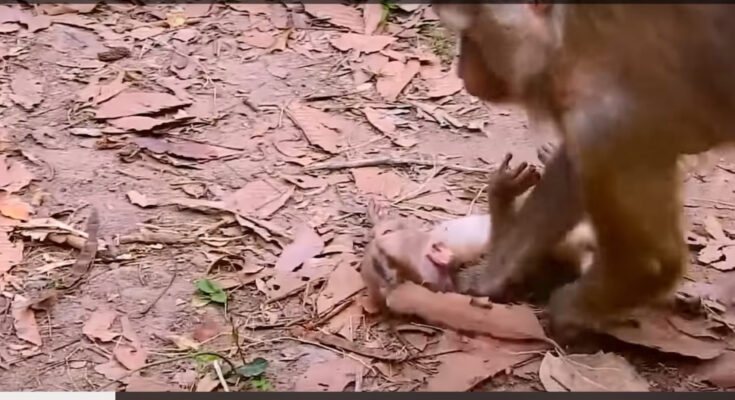In a disturbing scene captured by wildlife observers, a mother monkey was seen brutally attacking her infant — an incident that has shocked both scientists and animal lovers around the world. While maternal affection is one of the strongest forces in nature, this rare and violent behavior reveals the complex emotional and social lives of primates, as well as the pressures they face in the wild.
A Scene That Shattered Expectations
The footage, recorded in a tropical forest reserve, shows the mother aggressively hitting and biting her infant after a dispute within the troop. The baby, too young to defend itself, cried out for help while nearby monkeys looked on but did not intervene. Such a sight runs counter to our instinctive view of maternal love and protection — yet, in the animal kingdom, it is not entirely unprecedented.
Experts in primate behavior emphasize that while mother–infant bonds are typically strong, they can break down under extreme stress. Factors such as food scarcity, troop instability, or the mother’s low social status may trigger aggression. In some cases, hormonal imbalances or postnatal stress — not unlike postpartum depression in humans — can also lead to erratic behavior.
Understanding the Science Behind the Violence
Primatologists who study macaques, baboons, and chimpanzees have documented rare cases of maternal abuse or neglect. These events are often linked to environmental pressures. For instance, when food is limited or competition for dominance intensifies, a mother may redirect her frustration or anxiety toward her infant. Sometimes, first-time mothers without adequate social support show confusion or aggression instead of nurturing instincts.
In evolutionary terms, such behavior may also serve a grim biological function. If a mother senses that her offspring is weak or unlikely to survive, she may abandon or even harm it — conserving energy for future reproductive success. While this logic feels cruel from a human perspective, it underscores the harsh realities of survival in the wild.
Lessons About Empathy and Environment
This tragic incident raises deeper questions about empathy — both animal and human. Studies show that monkeys experience emotions such as anger, fear, grief, and affection, all influenced by their environment. When humans destroy habitats or disrupt natural social structures, the psychological toll on animals can manifest as stress-related aggression.
Wildlife experts stress that rather than viewing this mother as a “monster,” we should see her as a victim of circumstance. Her behavior may reflect ecological stressors, isolation, or captivity conditions — all human-caused problems. Protecting primate habitats and ensuring ethical conditions in sanctuaries and zoos can reduce the likelihood of such traumatic events.
A Reminder of Shared Vulnerability
The violent outburst of a mother monkey against her child is a sobering reminder of how fragile life and love can be — even in nature’s closest relatives to us. Behind this shocking moment lies a story of stress, environment, and the deep emotional complexity that unites all sentient beings. Understanding these moments with empathy and scientific curiosity may help us not only protect animals better but also reflect on the shared struggles of all mothers — human or otherwise.



